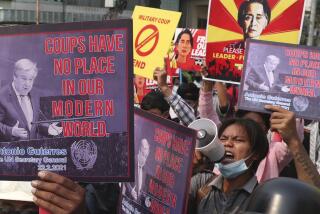A high point for Nepal
THERE ARE A thousand ways for war to break out, it seems, but so few chances for peace to prevail. So let us take a moment to celebrate developments in Nepal, whose people danced in the streets last week after Maoist rebels signed a peace accord with the government to end a decade-long insurgency that has killed 13,000 people.
Nepal’s political progress has been nothing short of remarkable. In less than seven months, its demonstrations of “people power” have forced a tyrannical king to surrender power and pushed the violent insurgents to the negotiating table. On Dec. 1, the insurgents will take their place in a temporary Cabinet; their army is to be confined in camps, and they will participate in elections next year. Meanwhile, the king has been stripped of immunity and virtually all his powers. It has not been easy or painless, but it has been accomplished without suicide bombings, without military action and, except for some skillful U.N. diplomatic help in the endgame, without foreign intervention.
There are, of course, many ways the peace deal could unravel in the South Asian nation of nearly 30 million people, home to eight of the world’s 10 highest mountains. It is highly unlikely that the inept and reviled King Gyanendra could manage a comeback. He triggered the crisis by dismissing the elected parliament and prime minister. Still, his dynasty is 238 years old, and some Nepalis believe that he is the reincarnation of the Hindu god Vishnu. The new legislature, to be elected in June, is slated to take up the controversial issue of whether Nepal should be a kingdom or a republic.
Long before the elections, however, there is the possibility that the power-sharing arrangement in the interim government will break down. The U.N. can provide monitoring, but it cannot force the rebels or the royal army to stand down their troops or heavy weapons -- and light arms simply can’t be corralled.
One of the most tragic legacies of Nepal’s lengthy violence is the thousands of people who have disappeared. Human rights activists are keen to see those responsible on both sides prosecuted. Perhaps the Nepalis, who’ve shown great wisdom and creativity in applying the lessons of democratic activism in other lands to their own democracy movement, will manage the trick of balancing the need to punish the guilty with the imperative of reconciling a dangerously and bitterly divided society.
More to Read
Sign up for Essential California
The most important California stories and recommendations in your inbox every morning.
You may occasionally receive promotional content from the Los Angeles Times.










